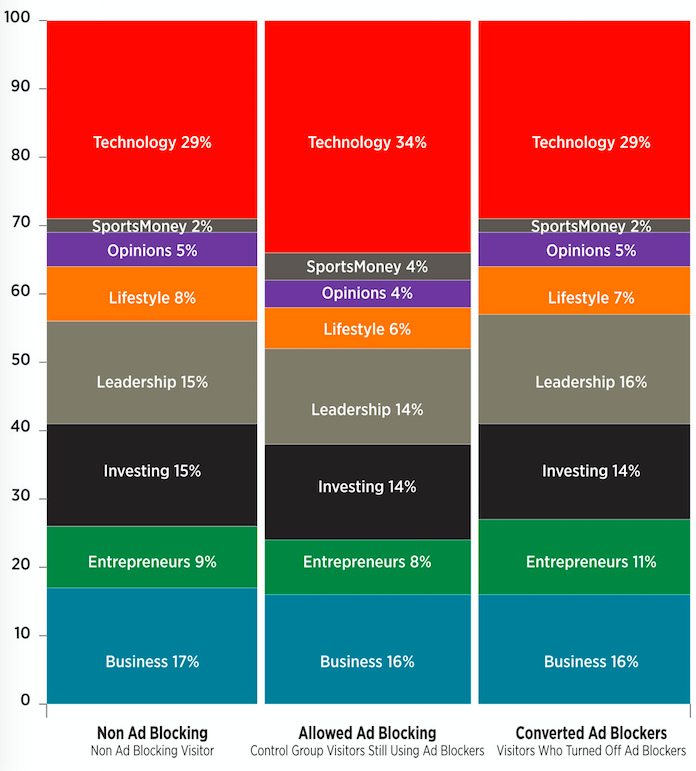Secure your place at the Digiday Media Buying Summit in Nashville, March 2-4

Coveted tech savvy readers aren’t quite as unwilling to disable their ad blockers as publishers may have feared, Forbes has found in its experiment to combat ad blocking.
Forbes has been unusually experimental — and transparent — when it comes to ad blocking. In December, it started blocking access to the site for half its desktop visitors who use ad-blocking software unless they disabled their ad blockers. It didn’t go over well on Twitter; people denounced the publisher for its experiment and then for apparently serving a popup ad after promising an ad-light experience for readers who disabled their ad blockers.
Forbes chief product officer Lewis D’Vorkin has been writing about the experiment and cataloging its results in his blog, material that’s no doubt of high interest to the growing number of publishers who are similarly trying to combat ad blocking without alienating valuable readers.
In a follow-up post today, D’Vorkin shared a chart showing what content sections people visited in the first full month of the ad blocking experiment. Turns out the tech section’s share of traffic was roughly the same across ad blocker and non-ad blocker readers. The same was pretty much true for readers of gaming content, who also tend to be early adopters of ad blockers.

D’Vorkin also said that Forbes would start testing different messages today aimed at ad blocker users, with a link to instructions on how to disable the software or whitelist Forbes. It’ll stop playing autoplay video ads at the top of posts, eliminating an intrusive ad format that’s often blamed for contributing to ad blocking adoption in the first place. And Forbes is also taking aim at people who turn their ad blockers off or whitelist Forbes, only to undo that action — it’s going to cut them off at one page on a subsequent visit.
But intrusive and annoying ads aren’t the only reason for the rise of ad blocking. Privacy and bandwidth are also big contributors. With that in mind, D’Vorkin said Forbes is taking steps to monitor ads for those issues. Forbes is planning to launch a new site just for mobile users, and it plans to use these learnings to inform those efforts.
“Understanding this, we plan to step back and audit the file size and load time of ads; the number of cookies, or tracking pixels, dropped on screens; the performance and security of ads from computer exchanges; and much, much more,” he wrote.
More in Media

From feeds to streets: How mega influencer Haley Baylee is diversifying beyond platform algorithms
Kalil is partnering with LinkNYC to take her social media content into the real world and the streets of NYC.

‘A brand trip’: How the creator economy showed up at this year’s Super Bowl
Super Bowl 2026 had more on-the-ground brand activations and creator participation than ever, showcasing how it’s become a massive IRL moment for the creator economy.

Media Briefing: Turning scraped content into paid assets — Amazon and Microsoft build AI marketplaces
Amazon plans an AI content marketplace to join Microsoft’s efforts and pay publishers — but it relies on AI com stop scraping for free.





